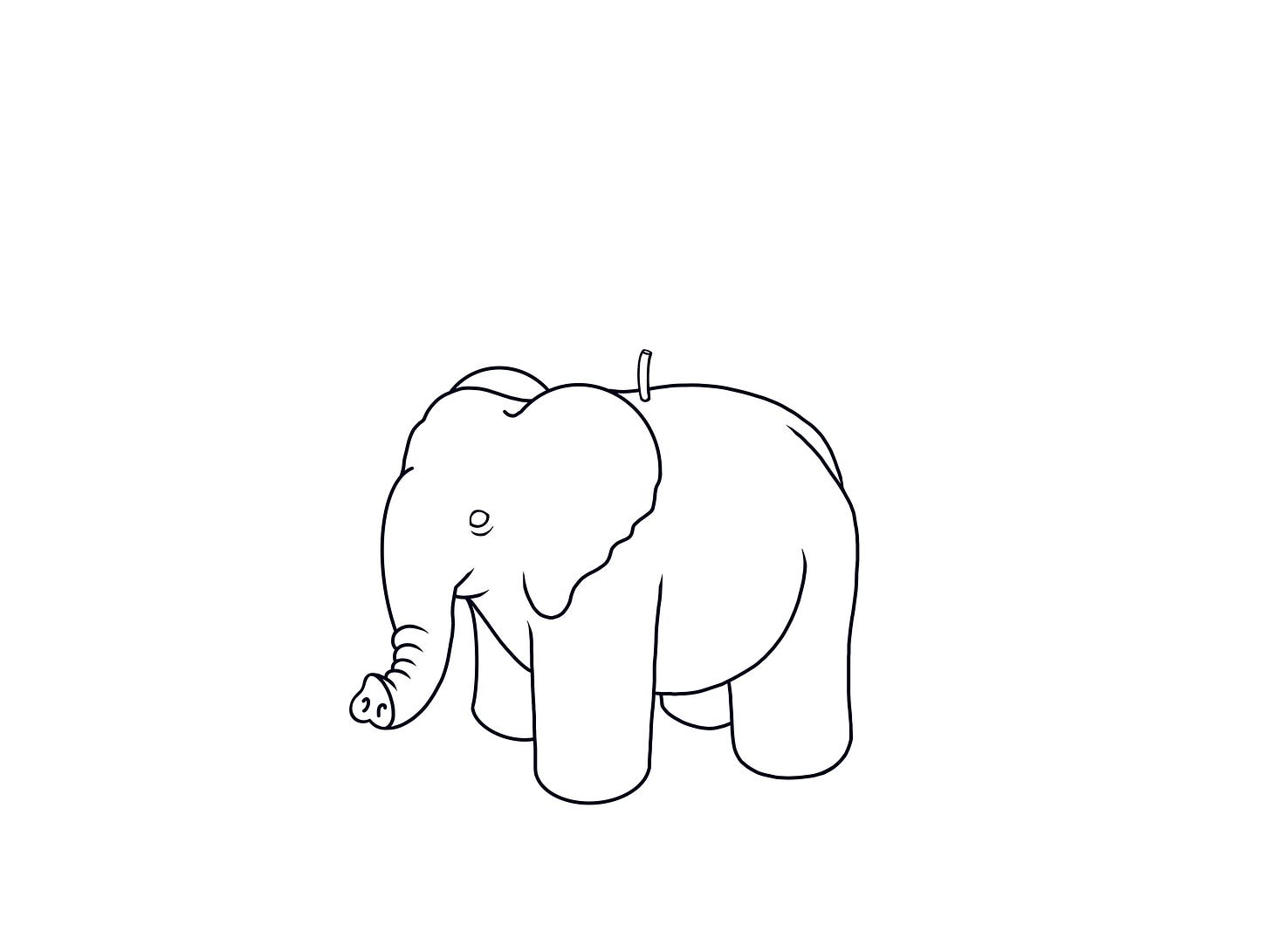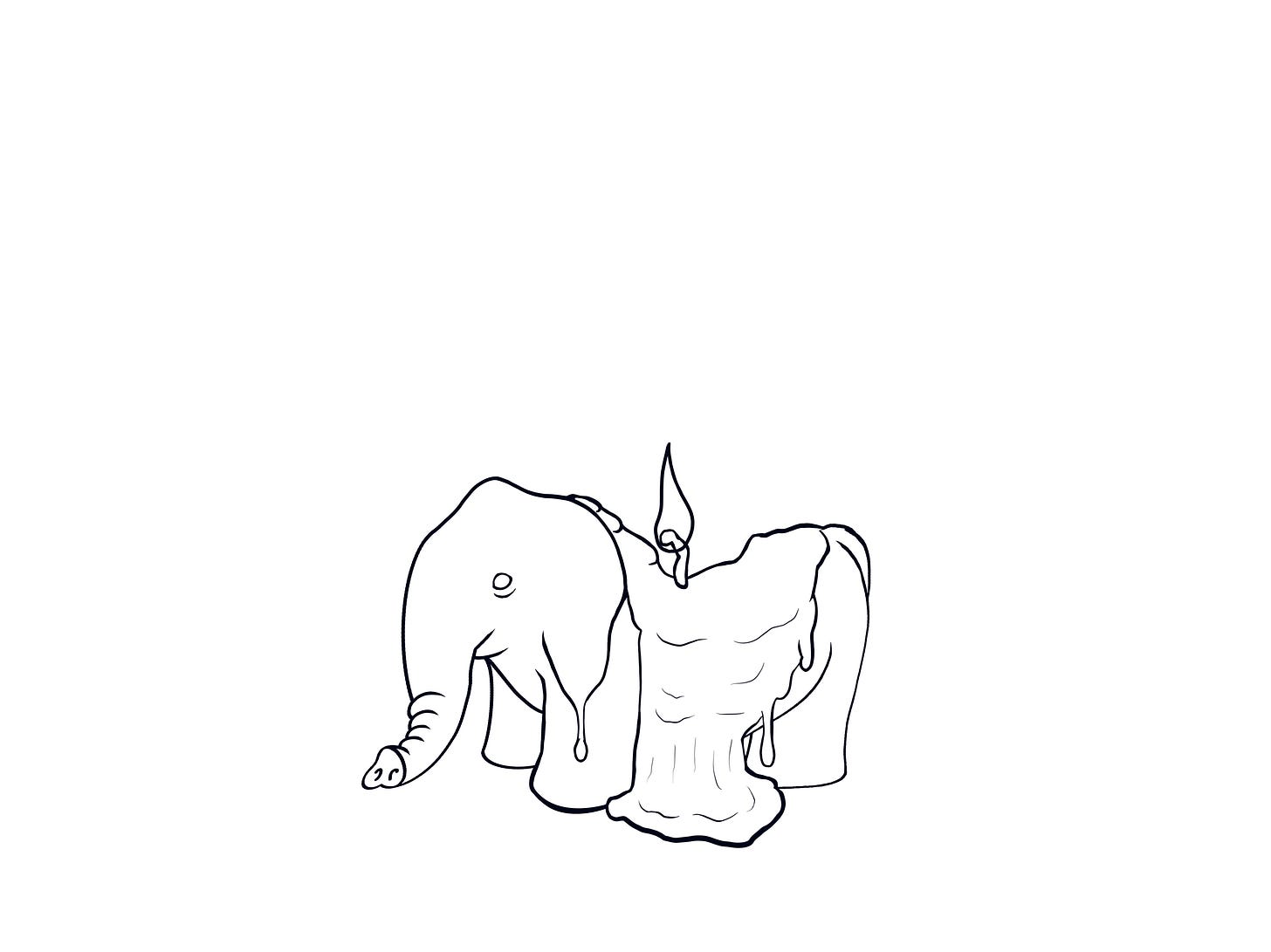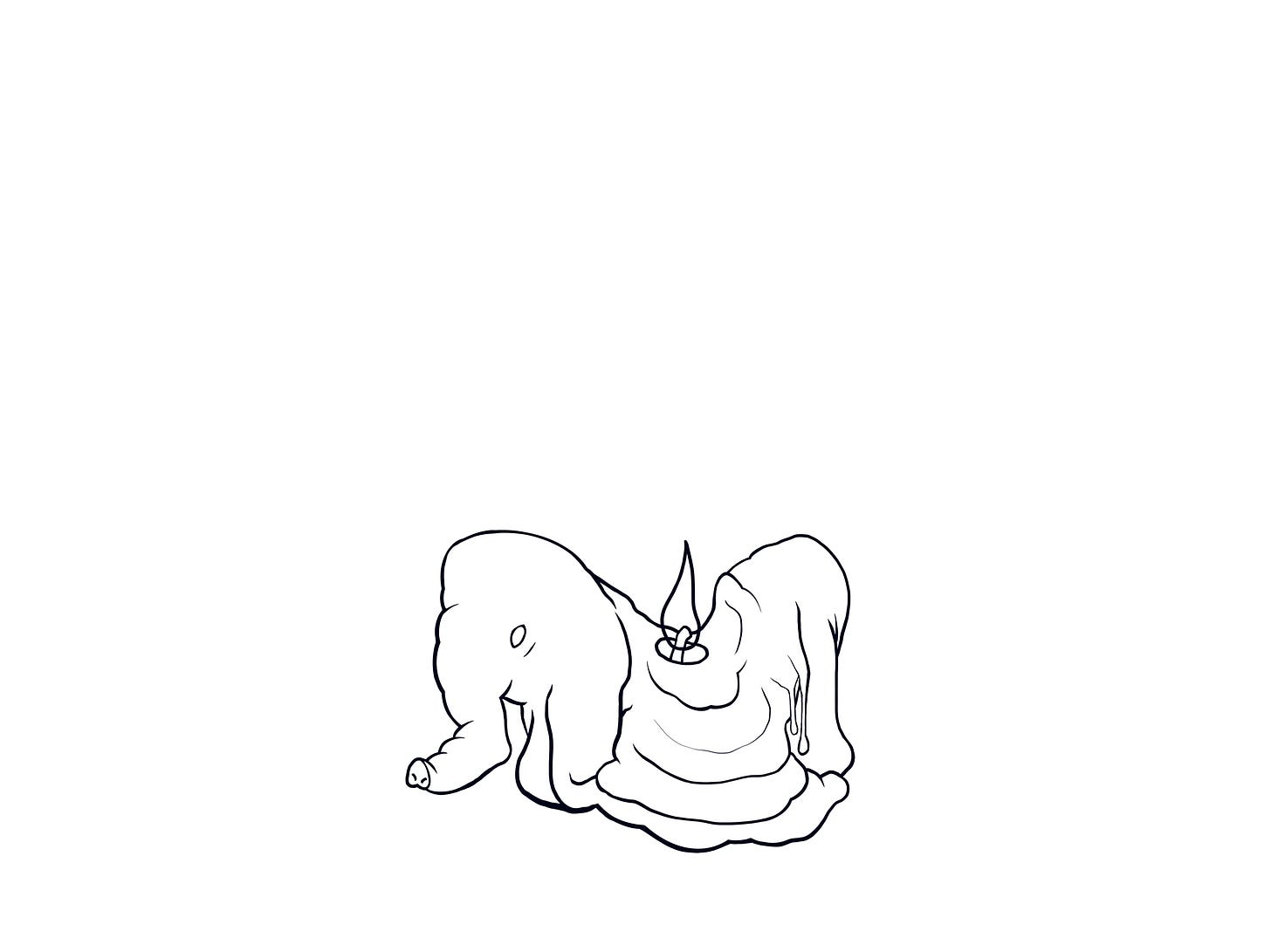Do You See What I See?
On cynicism, the reason for the season, and Christmas miracles.
Merry Christmas, readers new and old.
I have about a dozen drafts in various stages of completion, each with its own introduction in which I try to explain myself, to justify or at least contextualize my extended radio silence. Each version varies in minutia, but the gist is this: I have become an impossibly exacting critic of my work, and nothing I’ve written has met my own standards. This piece, among other things, is an attempt to short-circuit my inner critic. I gave myself 24 hours to write, proofread, and publish it. It is inspired by my son’s reaction to experiencing the Christmas season, which for me has been a source of profound joy and emotional catharsis. It’s something that I want to communicate to you in full, but know that I’ve fallen short. Without further ado, a partial transmission.
At some unremarkable point in my adulthood, I became a cynic. I did not notice it as it occurred; it was one of those transitions that occur too gradually to perceive until it is too late to reverse course. Long before my transformation, I sometimes acted cynically. I could squint my eyes and see the world as a cynic might, discovering a world populated exclusively by self-serving, deceitful agents, whose motives were usually malevolent and always motivated by self-interest. I suppose that one day, I peered through that lens to find myself unable to unsee that dismal landscape.
The worldview produced by cynicism is not without merit and can prove quite seductive. It is especially compelling for two reasons. The first is its explanatory power. Like astrology, cynicism has an ontological scope applicable across a vast and diverse array of contexts; like Freudian psychoanalysis, cynicism is a universal explanation. The second is its efficacy as a defense mechanism. By assuming the worst about other people—that they act exclusively in bad faith, and that their stated motives are laden with deceit—it becomes nigh impossible to be wounded by them. Betrayal requires a measure of vulnerability that the cynic lacks, and by preemptively anticipating it, cynicism deprives the eventual doublecrossing of its sting.
This comes at a cost. Like all grand theories, the sheer breadth of cynicism’s explanatory scope comes at the expense of predictive depth; explanations that can be modified ad hoc to explain everything can predict nothing, and cannot anticipate real novelty. As a defense mechanism, cynicism is likewise imperfect. Because of course, at bottom, people are only sometimes malevolent, only sometimes deceitful. All people act out of self-interest on some occasions and have (at least) the potential to inflict real cruelty upon their fellows. But all people also have (at least) the capacity for genuine altruism; all people believe at least a portion of what they say. A hermeneutics of real cynicism cannot interpret human behavior and relationships with the requisite nuance to represent human beings in all their moral complexity, and—crucially—their moral inscrutability. Cynicism renders human motives nothing if not scrutable; in so doing, it is self-limiting, losing access to the staggeringly diverse palette of reasons, beliefs, and values from which agents compose and recompose themselves in infinite variation. For its adherents, it is a Rosetta stone, a universal translator, but—oddly—its output is a single string, repeated ad infinitum: bullshit, bullshit, bullshit.
As a defense mechanism, cynicism is similarly flawed. It can be likened to a kind of spiritual DNR or hospice. By its own estimation, there exists no real treatment that might reverse the world’s bleak and hopeless course; in the absence of an antidote, the most humane course of action is to dope one’s self with the palliative of hopelessness, which dulls the worst of the pains on offer. And—if the cynic’s diagnosis is correct, and the human condition is as terminal as he says it is—so much for the better. But what if it is not?
Growing up as a Christian, I remember how, around Christmastime, I would be inundated with reminders about the real reason for the season. I understood this ‘reason’ as being Christ’s birth, the miraculous and necessary precursor to his mortal death on the cross and his eventual repudiation of death itself—not merely his own, but Jesus’s victory over the grave as such. There were multiple ways to misinterpret the holiday—the worst being to give in to the commercialization of it, to fall prey to greed and envy over material things—but it was also a disservice to celebrate for the mere love of one’s brother, to imagine Christmas a secular light in a season of dark.
For a cynic, there is perhaps no story more hopeless in its naivete than that of the Nativity. The Greatest Cuckolding Ever Told. This is because the hermeneutics of cynicism lacks the resources with which to interpret a miracle as anything other than a hoax, a scam. This is also why I could not make sense of it—of the many Christmases that I have, as an adult and a cynic—either dreaded from the beginning or, as often, anticipated with measured optimism only to find myself bitterly disappointed in the car, driving home, because I had squandered the holiday fighting with my brother during another of our precious biannual visits. Or not even fighting, or not even my brother. Fundamentally, I had wanted something that I could not articulate and could thus not receive, even had it been on offer. My wife Hannah has grown accustomed to my post-holiday bad moods, my anxiety, and what has been, in truth, a shameful spirit of ingratitude, which I have justified by positioning myself as uninterested in the accumulation of more things. (Except when I want more things.)
Last Easter, I tried to write about the Resurrection. My working thesis was this: the story of Easter has a truth in it that is relevant to our lives on Earth, even if it didn’t literally happen. I couldn’t finish it; no matter how I tried, I could not convince myself. What is the value of a metaphorical resurrection in the face of real death?
I put it away, forgot about it, and the remainder of the year flew by; before I knew it, it was December. This will be Graham’s second Christmas, but the first during which he understands that it is Christmas; the first Christmas that he can pick out snowmen, reindeer, Santa, and Christmas trees. He is mature enough to know what a present is, but too young to care what is inside it. Two days ago, coming home from a walk, he noticed a Christmas decoration that Hannah had put up at our front door: a felted Christmas gnome. “Christmas tree,” he called it.
“Christmas gnome,” I corrected him.
“Christmas gnome,” he said, grabbing it by its hat. He insisted on bringing it inside. Shortly after, he discovered its partner and has carried the two gnomes with him ever since. He loves them. He really loves them—not for reasons—but just because. They’re cheap and ugly, made in China, and probably dangerous, but my son loves them.
If there is one phenomenon truly anathema to cynicism, it is miracles; by definition, miracles are events believed so improbable or impossible that, when they occur, they defy the very order of things and upend all notions of possibility. To witness a miracle is to realize that one has had the measure of the world all wrong, and to be humbled and disoriented by it.
Was the blinding radiance of my son’s unalloyed joy over two Christmas gnomes a miracle? I am a cynic, but… I believe it was. Because the logic of the cosmos in that moment rearranged itself according to the contours of his smile. The specificity and intensity of his love created something of infinite value out of kitsch; so abundant was his joy that it spilled out of him and into me, and suddenly I fell hopelessly in love with the gnomes. It was a miracle: for a brief moment, our combined love moved something in me, and—with perfect clarity—I understood the whole universe to be a kind of ecstatic tautology, in which all language and all its objects refer endlessly back to the same ineffable core, and I was looking at it, smitten.
The lens that had become synonymous with my vision shattered, not a refutation of cynicism so much as its nullification. Through his eyes, I saw the world as it is: an endless parade of miracles, novelty at every turn, an endless exchange of love given and received. What is the meaning of the Ressurection if it is only a metaphor? What is the significance of the Nativity if Jesus was only a man, the genetic son of a carpenter? These are not meaningful questions, not even questions at all—just ill-formed strings, senseless and incoherent.
“Fear not,” said the angel to the shepherds outside Bethlehem, “for behold, I bring you good tidings of great joy, which shall be to all people. For unto you is born this day a Savior.” Or the prophet Isaiah, who foretold that He would be called the Wonderful Counselor, the Mighty God, the Everlasting Father, the Prince of Peace.
Or the three magi who, upon arriving in Jerusalem, asked, “Where is he that is born King of the Jews? for we have seen his star in the east, and are come to worship him.”
For the wise men, a star; for the shepherds, a heavenly host. For myself, two Christmas gnomes loved so ferociously that they—well, not came to life, not exactly—but became messengers of God’s love. The angels told the shepherds to spread the news across the countryside; I must do likewise. I write this to tell you what I’ve seen and heard: a Savior has been born and will redeem our fallen world; unto our shattered cosmos, a Son has been given.
Thanks for reading. Thanks to my brother for whipping up an illustration with only a few hours’ notice. Reach me at benjimahaffey@substack.com. My goal for the new year is not to go six months without publishing, but you know how resolutions are. Anyway, I wish you all a Merry Christmas, Happy Holidays, and good fortune in the year to come.







For the record, I "liked" this post for two reasons:
(1) Literally yesterday, when I was looking for a photo I took this summer and came across the memories of my visit with you, I thought to myself, "I wonder when Benji will publish something again?" I'm glad you scored a point against the inner critic.
(2) I enjoyed your writing, as I usually do, but I especially appreciated the first four paragraphs, and shared them with my students, since we spoke about that phenomenon yesterday.
(Also for the record, I did NOT "like" this post for the Christian propaganda reading of Jesus into the Book of Isaiah. That's not your fault, of course. You can blame the Christian propaganda machine, and that's not even being cynical.)
Excellent, though now we must have a conversation. Loved to see something was posted. Get in touch.